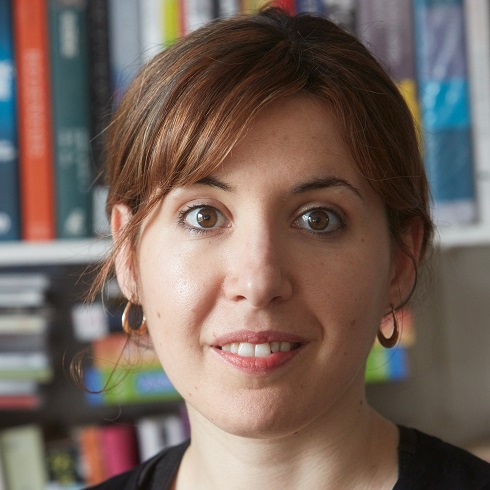– Andrea Núñez Casal –
Ramón y Cajal Senior Research Fellow
Department of Science, Technology and Society Institute of Philosophy, Spanish National Research Council (IFS-CSIC)
She is an inter/transdisciplinary researcher of the entanglements between microbes, embodiment, and biosocial inequalities. To date, her research has focused on (1) social and cultural studies of the human microbiome and immunology; (2) feminist ’embodied’ approaches and methods to address and remedy health inequalities associated with antimicrobial resistance (AMR) and chronic/recurrent infections; and (3) plural origins of decolonial theories of ¨Buen Vivir¨ and alterity. These main research lines revolve around an examination of how bioinequalities are being reproduced within science as it moves from and between the laboratory, the governmental, the popular, and the embodied. She uses a wide variety of theoretical perspectives including STS, body and feminist studies, cultural and medical anthropology and critical planetary health, and qualitative research methods including multi-sited and digital ethnographies, historical and policy analysis.
Funded by Obra Social ‘la Caixa’, her Ph.D. at the Department of Media, Communications and Cultural Studies, Goldsmiths (2019), examined how human microbiome science reinstates an immunology of inclusion and exclusion through the ‘biologisation’ of social categories of difference (race, gender, and class in particular). Her Ph.D. (no corrections) was the first sociocultural study of immunity, the microbiome, and inequalities.
She has been an Associate Lecturer at Goldsmiths (2014-2020) in the areas of cultural studies, gender and body studies, and Wellcome Trust Research Fellow at the Science, Technology and Innovation Studies, The University of Edinburgh (2016-2017). Her research has received several grants and awards including Wellcome Trust ‘Shared Futures’ (2019) and The EcoSocieties Fund by the University of Nottingham (2020). She has been an Associate Researcher in Genetics, Law and Society, The University of Oxford (2020-2021) and Margarita Salas Research Fellow at the Department of Philosophy and Anthropology, University of Santiago de Compostela (USC) (2022-2024).
Since 2021, she is a Collaborating Professor at the Open University of Catalonia (UOC), in the Interuniversity Master’s Degree in Planetary Health (UOC-Pompeu i Fabra-ISGlobal). She is an elected Council Member of the European Association for the Study of Science and Technology (EASST) (2023-2026). She is part of the Editorial Board of the journal Isegoría. She has recently been appointed Coordinator of the ¨Society¨ areas of the AMR CSIC Network and Microbiome CSIC Network of the Spanish National Research Council (2025.2027).
She joined the Department of Science, Technology and Society at the Institute of Philosophy, Spanish National Research Council (IFS-CSIC) in September 2024 as a Ramón y Cajal Senior Research Fellow (RyC2022-036985-I). Her current research explores the imbrications between the philosophical, cultural and embodied dimensions of immanence and transcendence and how the mystical interweaves in liminal modes and modalities both in terms of coexistence with and resistance to tenacious life forms (e.g. resistant microbes), socio-environmental transformations (e.g. extreme heat, floods) and forms of biomedical normativity and legitimation.
Please see here for Andrea’s IFS profile and personal page.
 Share
Share






Commentary
The latest commentary on the use of antimicrobials in society.
Care-ful collaboration: reimagining ethnography in transnational global health...
In this AMIS Commentary, Alice Tompson presents reflections on the collaborative working of the Antimicrobials in Society research teams, based...
AMR Training for Social Scientists
In this Q&A, Karlijn Hofstraat and Danny de Vries tell us about their “SPECIAL-SOC AMR” curriculum, a fantastic learning resource...
AMIS Final Report
We are delighted to release our AMIS Final Report. The report summarises the key activities, findings and outputs from the...